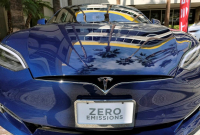Support strong Canadian climate journalism for 2025
The Trudeau government is proposing to help subsidize the cost of buying an electric car by up to $5,000, but has declined to establish a more stringent sales mandate, opting instead for voluntary targets.
Finance Minister Bill Morneau's 2019 budget, delivered March 19, proposes to spend $300 million over three years to introduce a nationwide "federal purchase incentive" of "up to $5,000" for electric vehicles or hydrogen fuel cell vehicles that sell for less than $45,000.
It also proposes providing $5 million over five years for Transport Canada to "work with auto manufacturers to secure voluntary zero-emission vehicle sales targets" to make sure that supply meets demand.
The government wants to encourage more Canadians to drive zero-emission vehicles, to help improve local air quality, cut carbon pollution that contributes to climate change and reduce transportation costs for families, according to the budget tabled by Morneau, who is known to drive his own electric car.
The amount of electricity required to power an electric vehicle costs far less than the amount of gasoline required to travel the same distance. Gasoline engines, which burn a mixture of air and fuel, are also less efficient than electric motors at converting potential energy into powering the wheels.
Burning gasoline, a fossil fuel, creates carbon pollution that leads to climate change. Older gas vehicles also produce noxious or toxic substances that affect air quality. Transportation is responsible for a quarter of all of Canada’s carbon pollution.
A $5,000 purchase subsidy was a direct recommendation from the government's Advisory Council on Climate Action, which released its interim report this month. Incentives have also been suggested by environmental groups as a way to shift more of the car-driving population to electrics.
This type of incentive, already in place in British Columbia and Quebec, and formerly in place in Ontario until the Ford government eliminated it, is also popular, with a recent poll demonstrating a large majority of Canadians in favour.
But environmental and social groups have said the only true way for Canada to achieve its target of selling 10 per cent of zero-emission vehicles by 2025 and 100 per cent by 2040 is to create a requirement forcing automakers to sell a certain percentage of their vehicles as electrics.
That's because, no matter how much money governments offer to subsidize purchases, potential buyers often run into problems with auto manufacturers like long wait times, low inventories, low knowledge at dealerships or a lack of vehicles on lots available for test drives.
A sales mandate, in force in Quebec, California and other U.S. states, and under development in B.C., may eventually be necessary nationwide, the advisory council said.
While it could initially offer voluntary targets, "the federal government should, however, be prepared to implement mandatory sales targets if voluntary measures do not sufficiently address supply issues," it stated.
The retail price cut-off of $45,000 is likely to ensure such a program applies more broadly to middle-class Canadians. The previous Ontario government, for example, was criticized for allowing its incentive program to be used by wealthy electric-car buyers who helped finance luxury vehicles, mainly early-model Teslas.
The budget document also says it wants to encourage "investment in Canada's domestic auto industry so that it can become a global leader in zero-emission transportation manufacturing."
It suggested auto manufacturers and parts suppliers could access funding through the government's general Strategic Innovation Fund for this purpose, for example if it wanted to invest in a new battery factory.
The council said electric cars could represent major economic opportunities along the supply chain, but there was a long way to go. Currently only one major electric vehicle is manufactured in Canada, the Chrysler Pacifica plug-in hybrid, it said.
Finally, the government is expanding a program to create a nationwide network of electric vehicle chargers, that has attracted controversy for also funding natural gas refueling stations that don't require renewable gas.
The government committed in its 2016 and 2017 budgets to roll out $182 million over six years to establish hundreds of these chargers.
In Tuesday's budget, it puts more money into the effort — $130 million over five years — as well as expands the program to include recharging and refueling stations "in workplaces, public parking spots, commercial and multi-unit residential buildings and remote locations."
The budget also includes a series of incentives to help reduce utility bills, including support for home energy retrofits.






Comments
Good initiative although my research shows that for rural areas where you need range the EV that have the ranfe are 45k to 50k. Basic. No luxury simply what is needed to get from small town A to small town B.
You are right Amber; the $45 k cut-off restricts the field to the last generation of electric vehicles with ~200k of range. I have a 300km trip to get to the nearest community with a fast charger. Although I hear several fast chargers are to be installed this summer.
Frankly, rural areas are going to be the last to go electric. It probably won't be feasible until the average range of an electric car is significantly greater than it is now; luckily that seems to be happening pretty fast.
Thx for this article Carl...some details like burning 1 liter of gasoline producing 2.3 kg. of co2 would be a good additional fact to help provide context
Also, when is the roll-out?
Most Canadians live in urban centres. This subsidy (for me) makes the difference between an electric and gasoline powered car in British Columbia. Now, if the dealers jack all the prices up accordingly, well, then we will know what is going on.
I always fear when the Feds put our tax dollars up to incentivize the uptake on various government programs as they are always " gamed" by outfits such as SNC Lavalin etc.
In this budget by example the Feds are offering a $5000' rebate on electric cars. Guess what the dealer price will be as they skim off most if not all of this rebate by playing with the numbers.
I don't see that happening in a very big way. Sure, some car companies might be using their electric models basically as greenwashing and have no intent to sell them in large numbers. So they might just bump the price and pocket the money.
But Tesla wants volume. If nobody else gets serious, Tesla will happily eat all their lunches. And Nissan is halfway serious, probably. They'll probably prefer increasing sales over pocketing a little quick money.
130 million over 5 years, to increase electric vehicle charging stations, ha, remember they just spent 4.5 billion on a pipeline. Any logic here?
This program sounds great, and it's certainly better than nothing. But . . . what does "up to" $5000 mean, exactly? Could be "down to" $1.
On the other hand, $300 million sounds like a lot, but I did some quick calculating. 300 mil over three years, so 100 million a year. If they actually give $5000 per car, that's a subsidy for 20,000 cars a year. OK, that's a tiny bit more than the total of battery and plug-in hybrids that were sold in Canada in 2017 (although the trend is steeply upward, or was until Ford ditched the Ontario subsidy).
But the total number of cars sold in Canada per year is around 2 MILLION. If the point is supposed to be to bring electric car sales to some noticeable percentage of total car sales, that money's gonna disappear real fast. Subsidizing 20,000 cars is not going to make a serious difference; this is a cosmetic program, as usual from the Liberals.
Check this article on the costs of elec vehicles.. This EV Program is smoke & mirrors, talk it up, but not have to pay up. .
https://driving.ca/hyundai/kona/features/feature-story/motor-mouth-why-…